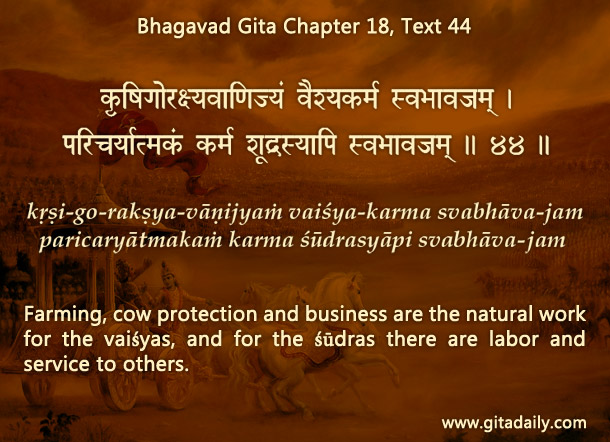Some people ask, “Why does bhakti culture stress cow protection?”
Multiple reasons. The cow is a gentle animal that gives us the same life-sustaining gift that our mother gives: milk. The cow, the giver of this superfood, is therefore treated like a mother. Just as we don’t abandon our mother when she grows old, similarly, we don’t abandon the cow when she ages and stops giving milk.
As the cow provides us life’s necessities, it is like the earth. In fact, we often address the earth reverentially as mother earth. And bhakti texts describe that the earth goddess often manifests as a cow. By respecting cows, we learn to respect the earth. We need to have such reverence for nature if we are to address the environmental disasters that are presently threatening our planet.
Pertinently, the Bhagavad-gita (18.44) specifies cow protection as a primary duty of the mercantile community. Some Gita versions translate the Sanskrit “go-rakshya” as cattle rearing, but it literally and clearly means cow protection. “Cattle rearing” conveys that cattle are reared solely for utilitarian purposes – first for milk and later for meat. In contrast, “cow protection” stresses that the cows are to be protected, even if they stop producing milk.
Normally, merchants close down a venture if it stops giving profit. But this Gita verse enjoins them to protect cows, irrespective of whether it is profitable or not.
This injunction trains them to see things beyond their monetary value and to develop an ethos of selfless service. They thus inculcate a mood of contribution, which contrasts with the contemporary culture of gratification, which treats animals and even humans as use-and-throw objects.
Thus, protection of cows is not an irrational idiosyncrasy; it is a profound principle to protect us all from greed and enrich us with respect and gratitude towards nature.
Think it over:
- How is the cow like a mother?
- How is the cow like the earth?
- How does cow protection protect the cow protectors from greed?
To know more about this verse, please click on the image
Explanation of article:
Podcast:


Leave A Comment